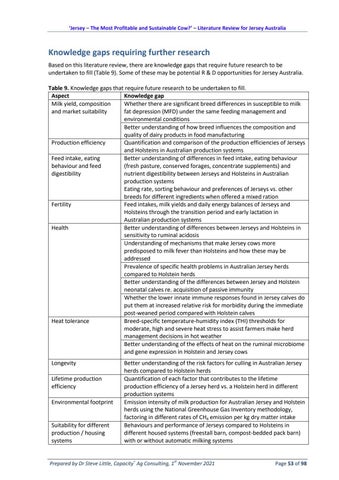‘Jersey – The Most Profitable and Sustainable Cow?’ – Literature Review for Jersey Australia
Knowledge gaps requiring further research Based on this literature review, there are knowledge gaps that require future research to be undertaken to fill (Table 9). Some of these may be potential R & D opportunities for Jersey Australia. Table 9. Knowledge gaps that require future research to be undertaken to fill. Aspect Knowledge gap Milk yield, composition Whether there are significant breed differences in susceptible to milk and market suitability fat depression (MFD) under the same feeding management and environmental conditions Better understanding of how breed influences the composition and quality of dairy products in food manufacturing Production efficiency Quantification and comparison of the production efficiencies of Jerseys and Holsteins in Australian production systems Feed intake, eating Better understanding of differences in feed intake, eating behaviour behaviour and feed (fresh pasture, conserved forages, concentrate supplements) and digestibility nutrient digestibility between Jerseys and Holsteins in Australian production systems Eating rate, sorting behaviour and preferences of Jerseys vs. other breeds for different ingredients when offered a mixed ration Fertility Feed intakes, milk yields and daily energy balances of Jerseys and Holsteins through the transition period and early lactation in Australian production systems Health Better understanding of differences between Jerseys and Holsteins in sensitivity to ruminal acidosis Understanding of mechanisms that make Jersey cows more predisposed to milk fever than Holsteins and how these may be addressed Prevalence of specific health problems in Australian Jersey herds compared to Holstein herds Better understanding of the differences between Jersey and Holstein neonatal calves re. acquisition of passive immunity Whether the lower innate immune responses found in Jersey calves do put them at increased relative risk for morbidity during the immediate post-weaned period compared with Holstein calves Heat tolerance Breed-specific temperature-humidity index (THI) thresholds for moderate, high and severe heat stress to assist farmers make herd management decisions in hot weather Better understanding of the effects of heat on the ruminal microbiome and gene expression in Holstein and Jersey cows Longevity Lifetime production efficiency Environmental footprint
Suitability for different production / housing systems
Better understanding of the risk factors for culling in Australian Jersey herds compared to Holstein herds Quantification of each factor that contributes to the lifetime production efficiency of a Jersey herd vs. a Holstein herd in different production systems Emission intensity of milk production for Australian Jersey and Holstein herds using the National Greenhouse Gas Inventory methodology, factoring in different rates of CH4 emission per kg dry matter intake Behaviours and performance of Jerseys compared to Holsteins in different housed systems (freestall barn, compost-bedded pack barn) with or without automatic milking systems +
st
Prepared by Dr Steve Little, Capacity Ag Consulting, 1 November 2021
Page 53 of 98






















